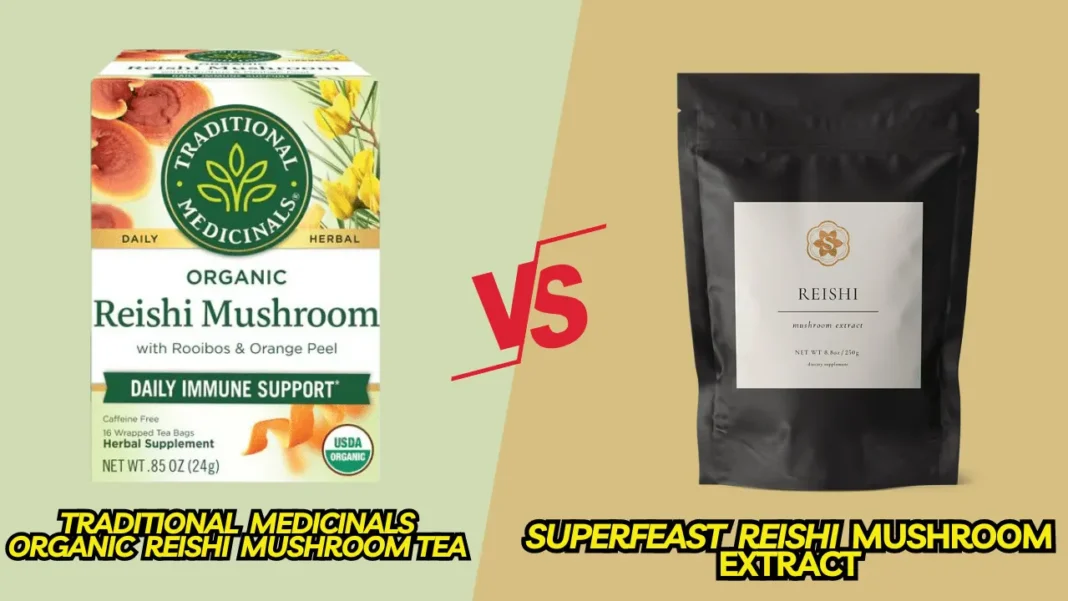Traditional Medicinals Organic Reishi Mushroom Tea vs. Superfeast Reishi: Support Your Immune System With Reishi Mushroom Tea
Are you tired of constantly getting sick? Maybe you’re not paying enough attention to your immune system. Maintaining optimal immune health is crucial for overall well-being, as the immune system plays a vital role in protecting the body against infections, illnesses, and diseases. According to the American Autoimmune Related Diseases Association (AARDA), autoimmune diseases, where the immune system mistakenly attacks the body’s tissues, affect approximately 50 million Americans, representing a significant portion of the population. Furthermore, data from the Centers for Disease Control and Prevention (CDC) indicates that chronic diseases such as cardiovascular diseases, diabetes, and certain types of cancer, many of which have underlying immune system dysfunction as a contributing factor, are leading causes of death and disability in the United States.
In recent years, there has been a notable increase in the use of health and nutrition supplements like adaptogens to support immune health. According to data from the Council for Responsible Nutrition (CRN), approximately 73% of Americans reported using dietary supplements in 2020, with immune health being one of the top reasons for supplementation.
Adaptogens, a class of herbs and mushrooms known for their ability to help the body adapt to stress and support overall health, have gained popularity as immune-supporting supplements. In this article, we’ll compare two leading reishi mushroom adaptogenic products, namely Traditional Medicinals Organic Reishi Mushroom Tea and Superfeast Reishi, to help you decide which is right for you.
White Mushrooms: Nutrition, Benefits, and Uses
WonderDay Mushroom Gummies vs. Real Mushrooms Capsules
Understanding your immune system
Before examining these products, it is important to establish a foundational understanding of what the immune system is and how adaptogens may help support it.
The immune system serves as the body’s defense mechanism against harmful pathogens, toxins, and foreign substances. Comprising a complex network of cells, tissues, and organs, the immune system works tirelessly to identify and eliminate potential threats while maintaining the body’s overall health and function. One of its primary roles is to distinguish between “self” and “non-self” entities, recognizing and neutralizing pathogens such as bacteria, viruses, and parasites that pose a risk to the body’s well-being. Additionally, the immune system plays a crucial role in wound healing, tissue repair, and surveillance against abnormal cell growth, contributing to overall health and vitality.
When the immune system is compromised or not functioning optimally, it can lead to various consequences that negatively impact health and well-being. Without proper care and support, the immune system may become weakened or dysregulated, increasing the susceptibility to infections, illnesses, and chronic diseases. Individuals with weakened immune systems may experience frequent infections, prolonged recovery times, and greater severity of symptoms when exposed to pathogens. Moreover, compromised immune function can contribute to the development of autoimmune disorders, leading to inflammation, tissue damage, and systemic dysfunction.
In addition to its role in infectious disease and autoimmunity, the immune system also plays a critical role in cancer surveillance and defense. A weakened immune system may fail to recognize and eliminate abnormal cells, allowing them to proliferate and develop into cancerous tumors. Furthermore, chronic inflammation resulting from immune dysregulation has been linked to the development of various chronic diseases, including cardiovascular disease, diabetes, and neurodegenerative disorders. Overall, neglecting to take good care of the immune system can have far-reaching consequences for health and well-being.

Adaptogens for immune health
Adaptogens are a class of natural substances, including herbs, mushrooms, and roots, that help the body adapt to stress and promote overall well-being. These compounds possess unique properties that enable them to modulate the body’s stress response system, fostering resilience and balance in the face of physical, mental, and emotional challenges. Adaptogens work by exerting a regulatory influence on various physiological processes, including the hypothalamic-pituitary-adrenal (HPA) axis, which plays a central role in the body’s stress response. By helping to regulate the production of stress hormones such as cortisol and adrenaline, adaptogens promote a state of physiological equilibrium, enabling the body to cope more effectively with stressors.
Among adaptogens, mushrooms have gained particular attention for their potent health-promoting properties, with reishi mushrooms (Ganoderma lucidum) being one of the most revered varieties. Reishi mushrooms have been used for centuries in traditional medicine systems, particularly in Asian cultures, for their purported health benefits. These mushrooms contain bioactive compounds such as polysaccharides, triterpenoids, and antioxidants, which contribute to their adaptogenic and immunomodulatory effects.
Supplementing with reishi mushrooms may promote a healthy immune system by enhancing immune function and regulating immune responses. Research suggests that reishi mushrooms exhibit immunomodulatory activity, stimulating the activity of immune cells such as natural killer (NK) cells, T cells, and macrophages, which play crucial roles in immune surveillance and defense against pathogens. By enhancing immune cell function, reishi mushrooms may help the body mount a more robust immune response to infections and diseases, reducing the risk of illness and supporting overall immune health.
In addition to their immune-modulating effects, reishi mushrooms also exert neuroprotective and cognitive-enhancing properties, benefiting brain health and function. Studies have shown that reishi mushrooms possess antioxidant and anti-inflammatory properties, which help protect brain cells from oxidative stress and inflammation, both of which are implicated in neurodegenerative disorders such as Alzheimer’s disease and Parkinson’s disease. Furthermore, reishi mushrooms may support cognitive function and mental well-being by promoting neuroplasticity, enhancing neurotransmitter activity, and modulating stress hormone levels, thereby contributing to improved mood, cognition, and overall brain health.
Overall, supplementing with adaptogenic mushrooms like reishi mushrooms may offer a holistic approach to promoting immune health, supporting stress resilience, and enhancing overall well-being. Nonetheless, it is important to note that health supplements are not FDA-approved; they cannot diagnose, treat, or cure any disease or health condition. Supplements should be used only as an adjunct to conventional treatment under the supervision of a healthcare professional.
Now that we understand the potential benefits of these adaptogens, let’s take a look at the two leading reishi mushroom supplements.
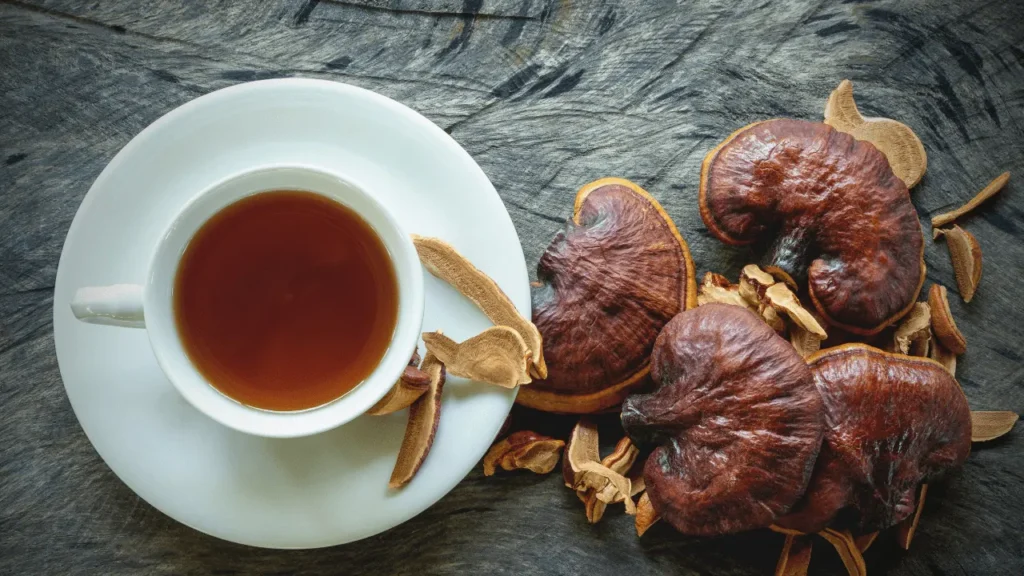
Traditional Medicinals Organic Reishi Mushroom Tea vs. Superfeast Reishi: mushroom potency
Adaptogenic mushrooms have garnered considerable attention for their remarkable health benefits, but not all mushroom supplements are created equal. One key distinction lies in whether the supplement utilizes the fruiting body of the mushroom or incorporates mycelium, the vegetative part of the fungus. Fruiting bodies contain concentrated bioactive compounds and nutrients that are sought after for their therapeutic effects, making them the preferred choice for medicinal purposes. In contrast, mycelium lacks the same bioactive profile and potency as the fruiting body, as it primarily serves as the fungal organism’s feeding and nutrient-absorbing structure.
Supplements that exclusively utilize the fruiting body of the mushroom offer superior quality and efficacy compared to those incorporating mycelium. Fruiting bodies contain a rich array of bioactive compounds, including polysaccharides, triterpenoids, and antioxidants, which contribute to the mushroom’s medicinal properties. By focusing on the fruiting body, supplement manufacturers ensure that consumers receive the full spectrum of health-promoting compounds inherent in the mushroom, thereby maximizing therapeutic benefits.
In this category, Superfeast Reishi emerges as the better option compared to Traditional Medicinals Organic Reishi Mushroom Tea due to its exclusive use of the fruiting body. By prioritizing the fruiting body, Superfeast Reishi ensures that its reishi mushroom powder contains the highest concentration of bioactive compounds, providing maximum health benefits to consumers. In contrast, Traditional Medicinals Organic Reishi Mushroom Tea incorporates mycelium, compromising the product’s quality and potency.
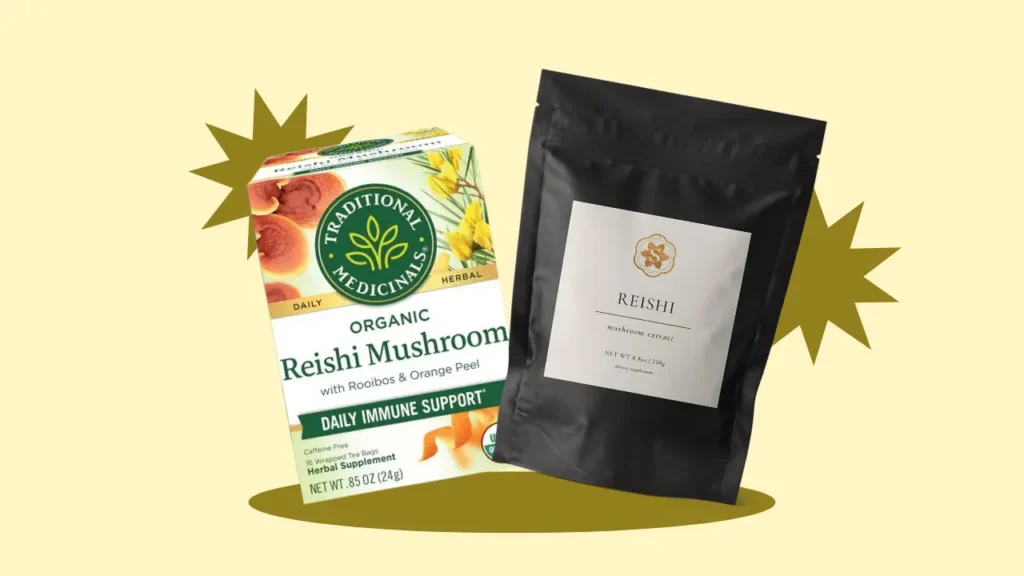
Traditional Medicinals Organic Reishi Mushroom Tea vs. Superfeast Reishi: sourcing
Commendably, Traditional Medicinals Organic Reishi Mushroom Tea boasts locally sourced ingredients and is manufactured in a solar-powered facility in Sebastopol, California. However, Superfeast Reishi surpasses it in sourcing quality and method with its careful dual-extraction process and the utilization of Dì Dào sourcing.
Dì Dào sourcing is a classification reserved for the highest quality herbs in China, indicating superior potency and authenticity. Superfeast procures its reishi mushrooms from the forests of the Dabie Mountains in China and collaborates with small-batch, independent farmers deeply rooted in traditional herb cultivation methods. By maintaining a direct connection with farmers, Superfeast can oversee every step of the cultivation and harvesting process, ensuring that only the highest quality reishi mushrooms are used. This translates into a product that is not only effective but also ethically sourced and environmentally sustainable.
Superfeast’s commitment to quality extends to its extraction methods. The company employs a careful dual-extraction process, which maximizes the extraction of bioactive compounds from the reishi mushrooms, including polysaccharides, triterpenoids, and antioxidants. This ensures that Superfeast Reishi contains a potent concentration of beneficial compounds, providing maximum health benefits to consumers.
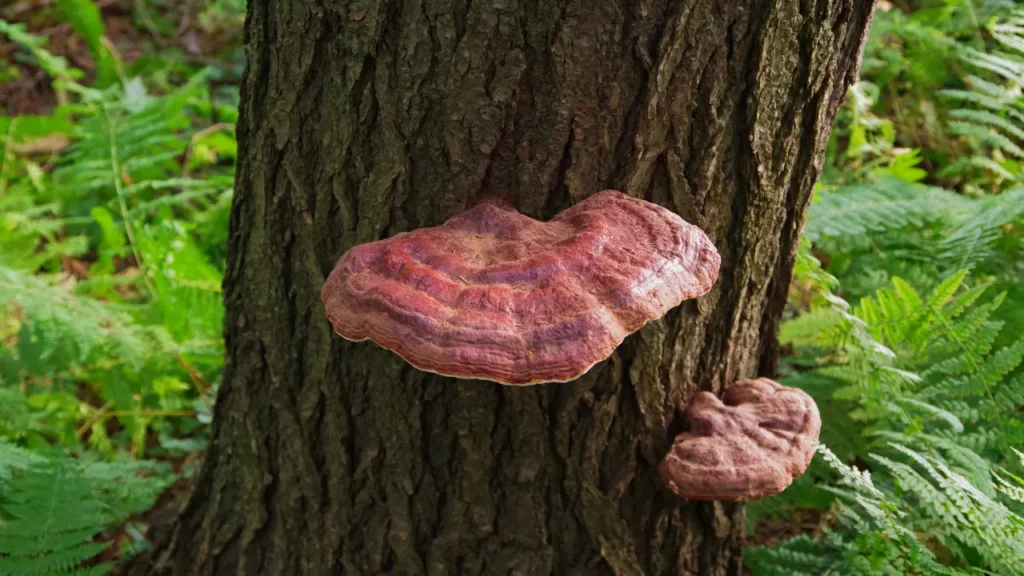
Traditional Medicinals Organic Reishi Mushroom Tea vs. Superfeast Reishi: versatility
Compared to Traditional Medicinals Organic Reishi Mushroom Tea, which is available only in teabag form, Superfeast Reishi offers a more versatile option for supplementation due to its convenient powder form. This powder form allows for greater flexibility in consumption, as it can be easily incorporated into various beverages, such as smoothies, juices, or even water. Additionally, the powder form enables users to adjust the dosage according to their preferences and needs, providing greater control over supplementation. This versatility makes Superfeast Reishi a more convenient choice for people looking to integrate reishi mushrooms into their daily routine in a way that best suits their lifestyle and preferences.
Traditional Medicinals Organic Reishi Mushroom Tea vs. Superfeast Reishi: price
Traditional Medicinals Organic Reishi Mushroom Tea presents a slightly more affordable option compared to Superfeast Reishi, priced at $35.94 on Amazon, while Superfeast Reishi is priced at $39. While both products offer the benefits of reishi mushrooms, the price difference may be a consideration for those seeking a more budget-friendly option.
Traditional Medicinals Organic Reishi Mushroom Tea vs. Superfeast Reishi: the superior option
While both products are excellent reishi supplements for immune system support, Superfeast Reishi stands out as the better option than Traditional Medicinals Organic Reishi Mushroom Tea. By exclusively utilizing the fruiting body of the mushroom, Superfeast Reishi ensures superior potency and efficacy, maximizing the concentration of bioactive compounds for maximum health benefits. The brand’s commitment to meticulous sourcing practices, including careful dual-extraction and Dì Dào sourcing, underscores their dedication to authenticity, potency, and ethical cultivation methods. Additionally, Superfeast Reishi offers a more versatile option for supplementation with its convenient powder form, allowing for greater flexibility in consumption and dosage adjustment compared to the tea form of Traditional Medicinals Organic Reishi Mushroom Tea.
While Traditional Medicinals Organic Reishi Mushroom Tea presents a slightly more affordable option, the superior quality and efficacy of Superfeast Reishi make it a more worthwhile investment for those seeking the full therapeutic benefits of reishi mushrooms.
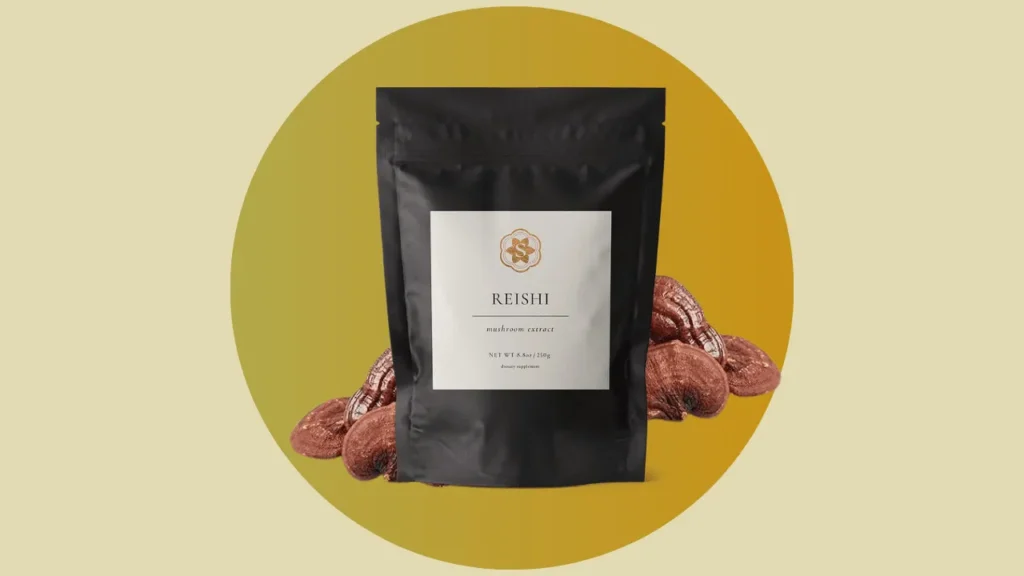
Building the foundations for a strong and healthy immune system
Supplementing with reishi mushrooms indeed offers notable benefits for immune health, but integrating other dietary and lifestyle changes can further bolster the immune system. Adopting a balanced and nutrient-rich diet plays a crucial role. Incorporating plenty of fruits, vegetables, whole grains, and lean proteins ensures adequate intake of essential vitamins, minerals, and antioxidants necessary for immune function. Key nutrients such as vitamin C, vitamin D, zinc, and selenium have been shown to support immune health, so focusing on foods rich in these nutrients is beneficial.
Moreover, maintaining a healthy weight through regular physical activity contributes to overall well-being, including immune function. Engaging in moderate exercise for at least 30 minutes most days of the week helps regulate immune responses and reduce inflammation. Additionally, managing stress levels is vital, as chronic stress weakens the immune system over time. Practices like meditation, yoga, deep breathing exercises, and adequate sleep can help alleviate stress and promote immune resilience.
Furthermore, avoiding harmful habits such as smoking and excessive alcohol consumption is essential for immune health. Both habits compromise immune function and increase susceptibility to infections and illnesses. Prioritizing good hygiene practices, such as frequent handwashing, proper food handling, and staying up to date with vaccinations, also plays a crucial role in preventing infections and supporting immune resilience.
When combined with these dietary and lifestyle changes, supplementing with reishi mushrooms can further enhance immune health. By integrating these adaptogens into a holistic approach to immune support, you can optimize their immune function and better protect yourself against pathogens and illnesses.

Further Reading
MindBodyGreen: 6 Awesome Health Benefits Of Reishi Mushrooms
Real Simple: Functional Mushrooms Types and Health Benefits
USA Today: Immune system down in the winter? Try these tips to get it stronger
Important Note: The information contained in this article is for general informational purposes only, and should not be construed as health or medical advice, nor is it intended to diagnose, prevent, treat, or cure any disease or health condition. Before embarking on any diet, fitness regimen, or program of nutritional supplementation, it is advisable to consult your healthcare professional in order to determine its safety and probable efficacy in terms of your individual state of health.
Regarding Nutritional Supplements Or Other Non-Prescription Health Products: If any nutritional supplements or other non-prescription health products are mentioned in the foregoing article, any claims or statements made about them have not been evaluated by the U.S. Food and Drug Administration, and such nutritional supplements or other health products are not intended to diagnose, treat, cure, or prevent any disease.


